
23-01-2015 20:56
 Godorova Olga
Godorova Olga
Hello. I thought, I've found some tiny Cheilymenia

23-01-2015 18:08
 Godorova Olga
Godorova Olga
Hello. I've found these on rotten stems of grass i

23-01-2015 16:06
This second Ascobolus was found on Alpaca dung but

23-01-2015 15:59
This was on gypsy horse dung. As the gypsys and th

22-01-2015 17:40
Found 22-01-15, in sandy soil, in forest with Pinu

23-01-2015 01:21
 Miguel Ángel Ribes
Miguel Ángel Ribes
Good night againThis yellow-pink Orbilia was growi

22-01-2015 12:32
Found 22-01-15, in Greece, in forest with Pinus ha

21-01-2015 00:37
Nick AplinSalut à tous, I found this inconspicous Orbili
Cheilymenia without hairs or?..
Godorova Olga,
23-01-2015 20:56
 Hello. I thought, I've found some tiny Cheilymenia and searched for the hairs, but find nothing...
Hello. I thought, I've found some tiny Cheilymenia and searched for the hairs, but find nothing...The ascocarps are tiny, bright orange, reach only about 1 mm. Grow on cow dung together with some young Ascobolus sp.
The ascos reach 250-280*30 mkm. Paraphises tips slightly enlargened, reach 10 mkm. Spores are smooth, about 25-30*15-17 mkm (pretty large).
Peter Püwert,
23-01-2015 23:24
Godorova Olga,
24-01-2015 08:21

Re : Cheilymenia without hairs or?..
Thank you very much, Peter, I'll check that!
René Dougoud,
24-01-2015 08:29
Re : Cheilymenia without hairs or?..
Oui, d'après les dimensions sporales, il devrait s'agir de Cheilymenia raripila (W. Phillips) Dennis, cependant il est impératif de définir, sur votre récolte, le type d'ornementation sporale dans le Bleu coton lactique. Sans cela ce serait que de l'approximation !
Voir dessins et photos
Cordialement
René
Voir dessins et photos
Cordialement
René
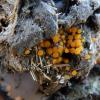
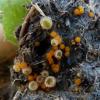
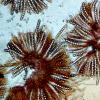
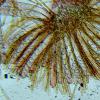
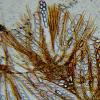
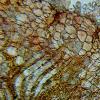
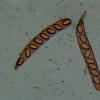
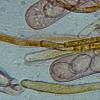
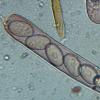
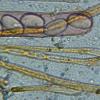
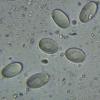
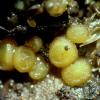
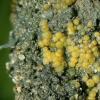
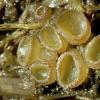
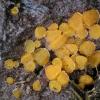
 Cheilymenia-raripila-M-0001.jpg
Cheilymenia-raripila-M-0001.jpg